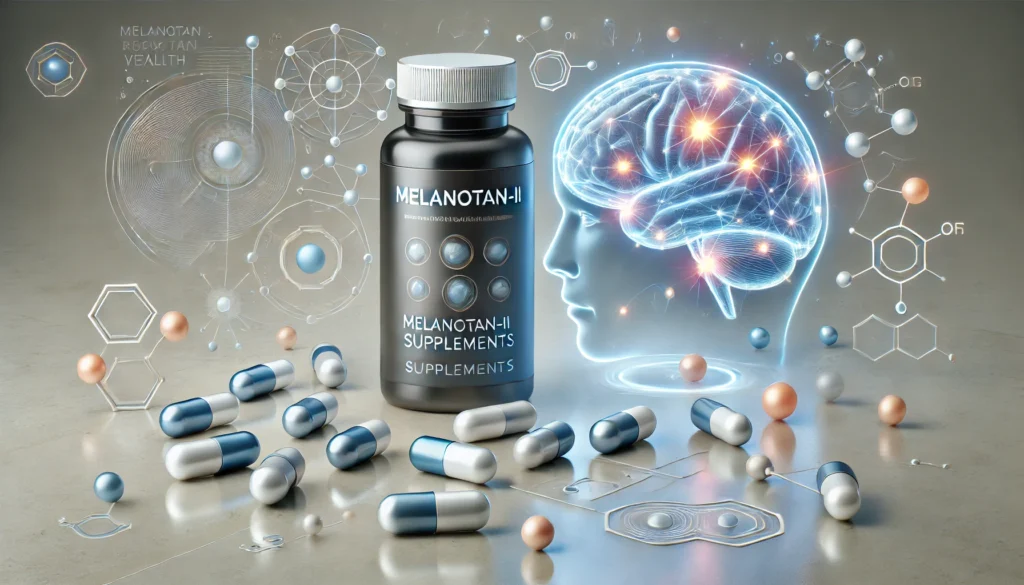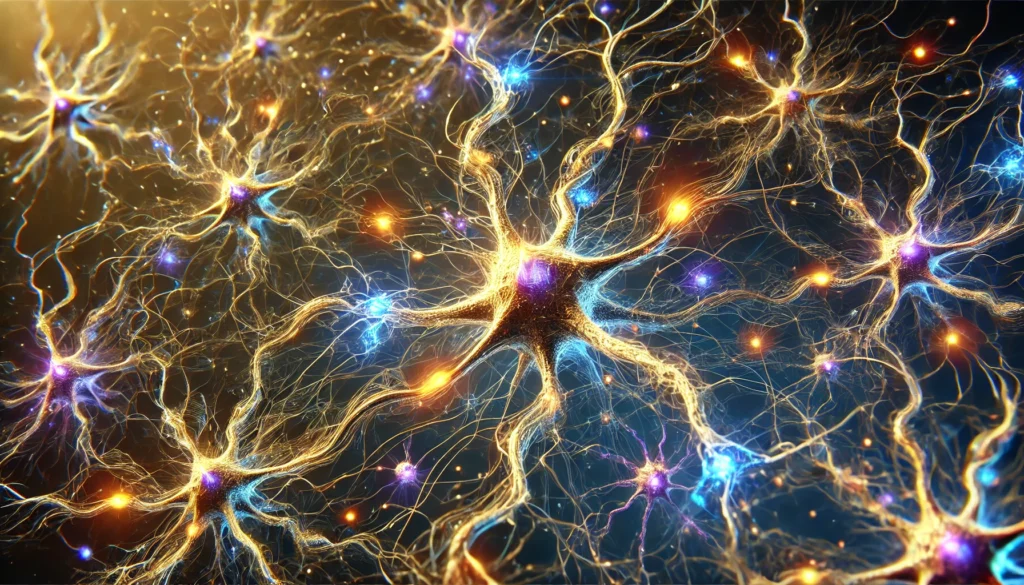Melanotan-II (MT-II) is a synthetic peptide that has attracted attention for its potential nootropic benefits, in addition to its well-known effects on skin pigmentation. Originally developed as a tanning agent, Melanotan-II has garnered interest in the realm of cognitive enhancement due to its impact on the brain’s neurochemistry. It is most frequently used for its ability to induce darker skin pigmentation by stimulating melanogenesis, the process by which skin cells produce melanin, but its broader pharmacological effects on the central nervous system have made it a topic of growing interest in the field of nootropics.
This article aims to explore Melanotan-II in-depth, focusing on its chemistry, physiological mechanisms, potential nootropic effects, dosing guidelines, possible side effects, and interactions with other supplements or medications. While its primary function remains as a tanning agent, we will examine the potential cognitive benefits it may offer, whether or not it can be considered a viable nootropic, and the safety considerations associated with its use.
You May Also Like:
Sources of Melanotan-II
Melanotan-II is a synthetic analog of the naturally occurring peptide α-melanocyte-stimulating hormone (α-MSH). This peptide was originally developed in the 1980s by researchers at the University of Arizona as part of a program to create a safer alternative to sun exposure for tanning purposes. Its structure is based on the amino acid sequence of α-MSH, a hormone produced by the pituitary gland that regulates pigmentation, appetite, and sexual function, among other physiological processes.
As a synthetic compound, Melanotan-II is typically not found in nature but is manufactured through peptide synthesis in laboratories. It is available for research purposes and in some markets as an unregulated supplement, although its legal status varies by country. The peptide is typically administered via subcutaneous injection, but other methods such as nasal sprays have been explored for easier self-administration.
Ashwagandha aids in memory retention and learning—Support Mental Clarity, Buy Today on Amazon!

Chemistry of Melanotan-II
The chemical structure of Melanotan-II consists of a cyclic structure with a substitution at the amino acid positions to improve its stability and potency relative to α-MSH. The sequence of Melanotan-II is Ac-Nle-cyclo(-Asp-His-D-Phe-Arg-Trp-Gly-Lys-), which enhances its ability to bind to melanocortin receptors, particularly the MC1R receptor that is primarily involved in skin pigmentation.
Melanotan-II acts as a melanocortin receptor agonist, with high affinity for the melanocortin 1 receptor (MC1R), the receptor primarily involved in stimulating the production of melanin in the skin. However, it also binds to other melanocortin receptors, including MC3R, MC4R, and MC5R, which are found in the brain and other tissues. This interaction with the brain’s melanocortin receptors is central to the peptide’s effects beyond skin pigmentation and has implications for its potential use as a nootropic.
Physiological Mechanisms of Melanotan-II in the Body and Brain
Melanotan-II exerts its effects through several mechanisms, most notably by activating the melanocortin receptors. These receptors play an important role in a range of physiological processes, including appetite regulation, sexual arousal, energy homeostasis, and skin pigmentation. Here’s a closer look at how Melanotan-II functions both in the body and the brain:
1. Skin Pigmentation
Melanotan-II’s most well-known effect is its ability to increase skin pigmentation. It activates MC1R receptors on melanocytes, which are the cells responsible for producing melanin in the skin. By stimulating melanogenesis, Melanotan-II leads to a darker skin tone without the need for direct UV exposure, making it an attractive option for individuals seeking a tan without sun damage. While this effect is useful for cosmetic purposes, it is not typically the focus in nootropic discussions.
2. Central Nervous System Effects
While its primary function is related to skin pigmentation, Melanotan-II’s action on the brain is also of significant interest, particularly its effects on mood, cognition, and appetite regulation. The melanocortin receptors in the brain play a critical role in several functions:
- MC3R is involved in regulating appetite, energy balance, and fat metabolism. When activated by Melanotan-II, it can lead to reduced food intake and increased energy expenditure, potentially contributing to weight loss or appetite suppression.
- MC4R, another key receptor activated by Melanotan-II, is primarily involved in the regulation of energy homeostasis, sexual behavior, and emotional states. The activation of MC4R has been linked to increased sexual arousal and could potentially influence mood and cognitive performance, though these effects are not fully understood.
- Neuroplasticity: There is some evidence to suggest that melanocortin receptors may also play a role in neuroplasticity, which is the brain’s ability to reorganize itself by forming new neural connections. This could suggest potential nootropic effects in terms of memory, learning, and cognitive flexibility.
3. Effects on Sexual Behavior
Melanotan-II has also been shown to enhance sexual arousal and libido, likely through its action on the MC3R and MC4R receptors in the hypothalamus, which are involved in the regulation of sexual function. Some studies have found that Melanotan-II administration leads to increased spontaneous erections in men and enhanced sexual desire in both men and women. This effect, while not directly related to cognitive enhancement, indicates that Melanotan-II may influence brain functions associated with reward and motivation, which could have broader implications for cognitive performance.

Nootropic Benefits of Melanotan-II
While Melanotan-II is not commonly considered a nootropic in the traditional sense, its effects on the central nervous system and the brain’s melanocortin receptors raise interesting possibilities. Some research has suggested that Melanotan-II may offer cognitive benefits by modulating brain chemistry in ways that could improve mood, focus, and cognitive performance. Here are the potential nootropic benefits that have been associated with Melanotan-II:
1. Enhanced Cognitive Performance
The activation of MC4R in the brain by Melanotan-II may improve cognitive performance, particularly in the areas of learning and memory. This is because melanocortin receptors, particularly MC4R, are involved in regulating neuronal activity in key brain regions such as the hippocampus, which plays a central role in memory formation. While there is limited direct evidence to suggest that Melanotan-II enhances cognitive function in humans, its neurochemical effects on brain regions involved in learning and memory suggest that it could offer cognitive benefits similar to those seen with other melanocortin-targeting compounds.
2. Mood Enhancement and Stress Reduction
Melanotan-II’s action on MC4R and other melanocortin receptors also suggests that it may have mood-enhancing properties. The activation of these receptors has been linked to improved emotional regulation, and some studies suggest that melanocortin-based therapies could be useful for conditions such as depression or anxiety. While the research on Melanotan-II specifically is limited, its potential for improving mood and reducing stress may indirectly support cognitive function by improving overall well-being and mental clarity.
3. Appetite Regulation and Energy Expenditure
Melanotan-II’s effects on the MC3R receptor may lead to appetite suppression and increased energy expenditure. For individuals looking to maintain focus and cognitive performance without distractions from hunger or energy slumps, Melanotan-II may provide an added benefit. The appetite-suppressing effects could also help with weight management, indirectly contributing to better mental focus by reducing metabolic stress.

Dosage and Supplementation Guidelines
Melanotan-II is generally administered through subcutaneous injection, with dosing protocols varying depending on the desired outcome. The typical dosage ranges from 0.25 mg to 1 mg per day, but the exact dosage should be individualized based on factors such as body weight, goals, and tolerance. It is important to note that Melanotan-II is not widely approved for human use by regulatory agencies such as the FDA, and its use should be approached with caution.
1. General Dosage Guidelines
For individuals seeking to use Melanotan-II for tanning purposes, the general dosing regimen often involves an initial “loading phase” of daily injections (typically around 1 mg per day) for 5–10 days, followed by a maintenance dose of 0.25–0.5 mg per day. For those exploring potential nootropic effects, similar dosing protocols could be applied, though the scientific evidence to support cognitive benefits remains limited.
2. Cyclical Use
Given Melanotan-II’s potent effects and the potential for tolerance to develop, many users employ cyclical dosing protocols, where the peptide is used for several weeks followed by a break to prevent downregulation of the melanocortin receptors.
Side Effects and Safety
While Melanotan-II is generally considered safe when used in moderation, it carries some potential risks and side effects, particularly due to its potent biological activity. Common side effects include:
- Skin Darkening: The most noticeable and common effect is skin pigmentation. While this is generally harmless, some individuals may find the degree of tanning undesirable or uneven.
- Nausea and Vomiting: Some users report gastrointestinal discomfort, including nausea, especially at higher doses.
- Increased Blood Pressure: There is some evidence to suggest that Melanotan-II can elevate blood pressure, which could be problematic for individuals with hypertension or cardiovascular concerns.
- Appetite Changes: While appetite suppression may be beneficial for some, it could be problematic for others, particularly for individuals with eating disorders or those who are underweight.
Unlock Brain Health and Mental Resilience with Advanced Bacopa Monnieri—Shop Now on Amazon!

Interactions with Other Supplements and Medications
Melanotan-II’s interactions with other supplements and medications are not well-studied. However, it is known to influence several biological pathways, including those related to appetite, mood, and sexual arousal, which could interact with medications targeting these systems.
- Appetite Suppressants: Combining Melanotan-II with other appetite-suppressing drugs or supplements could lead to excessive appetite suppression or unintended weight loss.
- Blood Pressure Medications: Due to its potential to raise blood pressure, individuals on antihypertensive medications should use caution when considering Melanotan-II supplementation.
Risks for Individuals with Certain Health Conditions
Individuals with certain health conditions should avoid or consult a healthcare provider before using Melanotan-II:
- Cardiovascular Disease: Melanotan-II can raise blood pressure, so individuals with hypertension or heart disease should avoid its use.
- Skin Cancer: As Melanotan-II stimulates melanin production, individuals with a history of skin cancer or melanoma should avoid its use due to the potential risk of exacerbating skin damage.
Conclusion: Should You Consider Melanotan-II as a Nootropic?
Melanotan-II offers a range of physiological effects, particularly related to skin pigmentation, sexual arousal, and appetite regulation. While the scientific evidence for its nootropic potential is still in its infancy, its ability to modulate brain chemistry through melanocortin receptor activation makes it an intriguing candidate for cognitive enhancement. However, due to the limited research on its nootropic effects, the risks associated with its use, and its potential for side effects, individuals should exercise caution when considering Melanotan-II as a supplement for cognitive enhancement.
As always, it is important to consult a healthcare professional before beginning any supplementation regimen, particularly for those with pre-existing health conditions or those taking medications that may interact with Melanotan-II.

References:
- Melanotan – Uses, Side Effects, and More. Retrieve from: https://www.webmd.com/vitamins/ai/ingredientmono-884/melanotan
- Melanotan II. Retrieved from: https://www.sciencedirect.com/topics/medicine-and-dentistry/melanotan-ii
- Why Getting Tanning Injections Is Dangerous and Should Be Avoided. Retrieved from: https://www.healthline.com/health/tanning-injections
- Is melanotan II safe to use for tanning? Retrieved from: https://www.medicalnewstoday.com/articles/is-melanotan-ii-safe-to-use-for-tanning
Important Note: The information contained in this article is for general informational purposes only, and should not be construed as health or medical advice, nor is it intended to diagnose, prevent, treat, or cure any disease or health condition. Before embarking on any diet, fitness regimen, or program of nutritional supplementation, it is advisable to consult your healthcare professional in order to determine its safety and probable efficacy in terms of your individual state of health.
Regarding Nutritional Supplements Or Other Non-Prescription Health Products: If any nutritional supplements or other non-prescription health products are mentioned in the foregoing article, any claims or statements made about them have not been evaluated by the U.S. Food and Drug Administration, and such nutritional supplements or other health products are not intended to diagnose, treat, cure, or prevent any disease.


